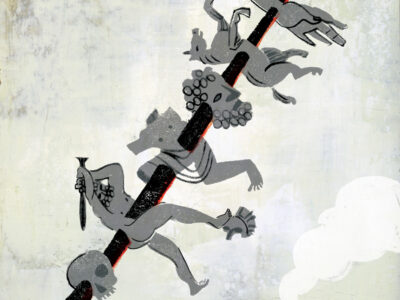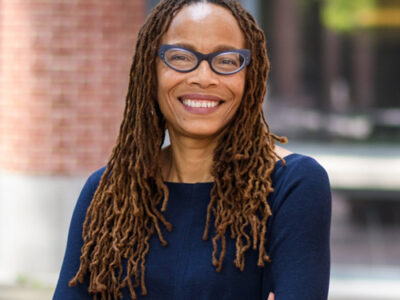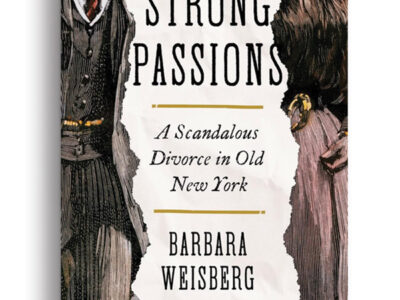An emeritus professor of sociology recalls his political and intellectual evolution.

WHEN MARX MATTERED: An Intellectual Odyssey; By Harold Bershady, faculty; Transaction, 2014, $49.95.
By Michael Zuckerman | Harold Bershady and I were colleagues at Penn for four decades. We had many mutual friends and some tangent interests. He taught sociology, with a tilt toward history, philosophy, and literature. I taught history, with a tilt toward the social sciences, philosophy, and literature. We were always cordial, never close.
Now, in his retirement, he has written a radiant reminiscence of those decades and of his coming of age in the years that came before them. And now that I know him better, I wish I’d known him better.
Harold’s account of what he calls his intellectual odyssey is a rare achievement. He captures as few autobiographers do the tumultuous complexity and confusion of childhood. His recall of the stuff the rest of us forget is astonishing. He was a New York Jewish boy caught up in the Great Depression and then in the Second Great War, trying to make sense of the poverty all around him and the relative prosperity of his own family, the Nazis and their murderous hatred of his people, his deep yiddishkeit and his dawning disbelief in Judaism, his yearning to save the world and the world’s recalcitrant refusal of it, and his love of ideas, of music, and, sometimes, of girls. He evokes all this—the inchoate tumble of thoughts and feelings and the way his precocious engagement with Marxism and radical politics brought them all together—with the luminous clarity of hindsight and, more remarkably, the achingly keen recollection of then-sight. He gives us the wise elder who sees now the significance of his boyhood identification with both Superman and Moses, and he gives us even more vividly the eight-year-old who adored the comic-book superheroes and the bible story of Exodus without making any connection between them.
What makes his account an achievement all the more rare is that he is a sociologist. Sociologists, like historians, hardly ever write memoirs of their own lives. It is not because we live dull lives, though I suppose some of us do. It is because we are drawn to sociology, or history, because we are more interested in society than in self. Our deepest feelings and failings, our bravest hopes and fiercest furies, usually appear only obliquely in our writing. They slither out in the shadings of a phrase or the slanting of a story. If we say anything confessional at all, we say it in the peripheries of our work, in asides and prefaces and acknowledgments, or when it is dragged out of us, in interviews for alumni magazines.
Consider the towering figures who taught sociology at Penn in Harold’s time here. Goffman, Rieff, Baltzell, Anderson, and Fox are, all of them, richly present in their work. But none of them ever attempted a book-length personal history as Harold does. Psychologically acute as they were, they looked around more than they looked inward. If they were not averse to introspection, they were certainly disinclined to do much of it in public.
Harold recounts his dreams, details the petty shames that bedeviled him, and recalls movingly the tormented moment that he gave up the piano for philosophy and the powerful pleasure of understanding ideas. He retrieves without embarrassment his first reading of The Communist Manifesto and his fond faith at age 14 that if the victimization of workers could be ended, the victimization of the Jews would be ended and the world would be saved. He was a precocious kid, and a dauntless one. He took Marx so seriously that, when he was 16, he tried to organize a union among the workers in his own father’s industrial shop. And he was as cheeky as he was precocious. In the summer before he started college, he made a point of chatting up professors—in truth, auditioning them—to see with whom he would study when he began classes that fall at the University of Buffalo.
There, in the time he spared for classes from his real studies in the John Reed Society and the Communist Party, he did so well that he went on to graduate study in philosophy. Then he gave up graduate school for an extraordinary succession of jobs: as a Chevy assembly-line hand, an executive trainee, a welfare caseworker, and an insurance-company investigator. By the time he resumed his pursuit of a PhD, he’d decided that it would be in sociology, not philosophy, though for the life of me I cannot fathom why a young man with such a rich experience of “real life”—so much more of the grit and sand and shit of American life than his more privileged peers—ended up a social theorist rather than an empiricist.
In any case, during his years outside the academy, he gave up his radical stereotypes of industrial laborers, businessmen, the very poor, and policemen and came to more generous apprehensions of them all. He also gave up his devotion to Marxist ideology.
As a boy, he’d had a startlingly mature sense of the world’s need for salvation from suffering. He’d seen the Jews as a people chosen to help those who needed help. He’d heard Marx as the voice of an ancient hope for salvation through messianic deliverance. As an adult chastened by experience, he came to see and fear the destructive potential of messianic utopianism. He grew disillusioned with Communism and broke with the Party. But he never gave up his hope of healing some of the world’s suffering. His departure from the Party was not subdued and sorrowful, in the way of the men who lamented the God that failed. It was righteous and triumphant, in the way of a man who felt a heightening, not a loss, of his youthful idealism. Like the great majority of his radical friends, he turned from Communism to liberalism, not conservatism. To this day, he refuses to repudiate Marx, whom he still sees—for all his failings—as one of the rare geniuses of the world, with Leonardo, Shakespeare, and a tiny company of others.
When Marx Mattered is, obviously, a book of special resonance for Penn people of a certain age, from its feel-good reminiscences of that awful Kelly and Cohen deli to its feel-bad revelations of rampant racism in the sociology department and of the refusal of senior sociology faculty to teach undergraduates. But it is more than a mere memoir of a bygone time at dear old Penn. It is a distillation of a lifelong engagement with great issues and ideas of the modern age, by turns sober and enchanting, revealing and concealing, passionate and professorial. It is witty, impish, and endearing. It offers a precious portrait of a generation as different from its immigrant parents as from its New Left progeny. And even as it does, it challenges that portrait, imploring in the end that we do better, that we seek not so much to distinguish between generations as to bridge them in the perennial quest for perennially imperiled human—and humane—continuity.




